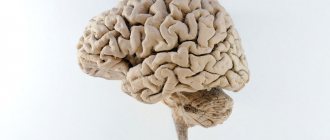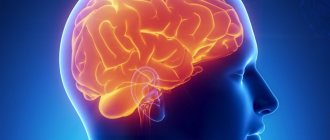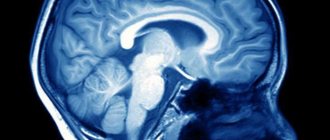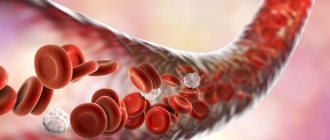Home>Articles>Alcoholic encephalopathies: signs, forms, treatment
quick menu (hide)
- Symptoms of alcoholic encephalopathy
- Development of the disease
- Acute types of disease
- Chronic form of alcoholic encephalopathy
- Diagnosis and treatment
Chronic alcohol abuse leads to the development of various mental and physical problems over time. All organs in the body are affected by excessive use of a toxic substance, including brain function. Alcoholic encephalopathy manifests itself during the transition from stages II to III of alcoholism, but in some cases much earlier. The disease, whether acute or chronic, interferes with a person's ability to think rationally and retain memories. If left untreated, it can lead to permanent brain damage.
Symptoms of alcoholic encephalopathy
Alcoholics are at risk of encephalopathy, which causes brain dysfunction. Symptoms of the disease are accompanied by psychosomatic and neurological changes:
- Weight loss, lack of appetite;
- Loss of muscle coordination;
- Involuntary movements or paralysis of the eyes;
- Anxious state with changeable mood;
- Short-term memory loss;
- Fatigue;
- Delirium, hallucinations.
The illness is characterized by profound confusion, indifference, inattention, drowsiness, or stupor. Side effects of the peripheral nervous system increase, and many develop severe autonomic dysfunction, characterized by sympathetic hyperactivity - tremor, agitation, or hypoactivity - hypothermia, postural hypotension, syncope. The torpor may progress to coma and end in death.
Literature:
- Alcoholic epilepsy: a manual for doctors / V. O. Generalov et al.; edited by V. O. Generalova. – 2nd ed. – Moscow: Max Press, 2015. – 43 p.
- Psychophysiological aspects of epileptic syndrome of alcoholic origin: abstract of thesis. ... Candidate of Medical Sciences: 19.00.02, 14.00.45 / Elistratova Tatyana Vladimirovna; [Place of protection: North. state honey. University]. – Arkhangelsk, 2007. – 19 p.
- Psychiatry: Textbook. for medical students universities / N.M. Zharikov, Yu.G. Tulip. – Moscow: Medicine, 2002. – 539 p.
Development of alcoholic encephalopathy
Encephalopathy leads to rapid damage to brain cells due to regular use of the toxin. Even in genetically healthy people with normal nutrition, constant poisoning of the body for more than 7 years is characterized by stage II or III of alcoholism. Symptoms also appear with periodic consumption of alcohol in large quantities - binge drinking. The pathology has a chronic or acute form.
The severe illness covers a wide range of alcohol-related intellectual and neurological syndromes, including Wernicke encephalopathy, Korsakoff's syndrome and other disorders affecting brain structures. The duration of the period from the first symptoms to a chronic disease is individual and depends on lifestyle. In some cases, clinical changes occur suddenly.
This pathology accounts for up to 70% of the death statistics - this figure is called by narcologists. Encephalopathy can be complicated by pseudoparalytic or psychoorganic syndrome, and can also lead to dementia. The prognosis for cure depends on timely diagnosis. Qualified timely treatment can correct all abnormalities.
Treatment of alcoholic encephalopathy requires hospital care and takes a fairly long period. Without medical attention, the disease becomes serious. Professionals monitor symptoms so the progression of the disorder is slowed or stopped.
Complications
Complications of encephalopathy are associated with severe and irreversible damage to the brain and represent the extreme extent of the symptoms observed:
- loss of self-care ability due to motor or cognitive impairment;
- dementia: loss of knowledge and skills up to complete collapse of personality;
- loss of vision and hearing;
- severe mental disorders;
- convulsions;
- disturbances of consciousness: stupor, coma;
- death.
Causes of development of alcoholic encephalopathies
Experts call the cause of the pathology long-term alcohol poisoning of the body - regular uncontrolled or daily consumption of drinks, binge drinking for a week or more. Additional risks arise from low-quality, homemade or technical drinks. The individual characteristics of the body cause the development of the disease with small doses of alcohol and rare intakes.
The main cause of encephalopathy is a deficiency of B vitamins, which ensure normal brain functioning. Alcohol changes metabolism and requires increased levels of thiamine. During long-term drinking bouts, vitamin reserves are reduced due to lack of appetite, poor-quality or insufficient food. Then problems appear with the processing of thiamine in the intestines against the background of changes in liver function, as well as a decrease in the levels of vitamins B6 and P. Progressive deficiency causes disturbances in the metabolic processes of digestion, vascular permeability, which mainly ends in cerebral edema.
The disease is personal in its rate of development, dominant symptoms, development options and final outcome. The diagnosis involves two main groups of alcoholic encephalopathies - acute or chronic.
Acute pathologies include:
- acute mitigated encephalopathy;
- Gaye-Wernicke syndrome or hemorrhagic polyencephalitis;
- encephalopathy with immediate course.
In the anamnesis of chronic patients, severe psychoses and acute encephalopathies are observed against the background of alcohol dependence. The chronic form is diagnosed as Korsak's psychosis in the form of alcoholic paralysis, polyneuritic psychosis and alcoholic pseudoparalysis.
Diagnostics
A neurologist is involved in the diagnosis and treatment of encephalopathy. Patient examination includes:
- survey: collection of complaints and anamnesis; it is mandatory to clarify information about previous diseases, injuries, risk factors, the time of the first violations, the rate of development, etc.;
- neurological examination: assessment of reflexes, sensitivity, muscle strength, motor function;
- electroencephalography (EEG): assessment of electrical impulses arising during brain function; allows you to identify signs of epilepsy, inflammation, the presence of tumors, etc.;
- Doppler ultrasound of the vessels of the brain and neck: assesses the quality of blood flow in large vessels, identifies areas of narrowing, assesses the volume of incoming blood;
- rheoencephalography: complements ultrasound, allows you to assess the tone and elasticity of blood vessels, detect blood clots;
- angiography: X-ray examination of blood vessels by introducing a contrast agent into them;
- CT and MRI: allow you to detect foci of sclerosis, tumors, inflammatory foci, consequences of stroke and other structural changes;
- blood tests (general, biochemical): make it possible to evaluate the functioning of the kidneys, liver, pancreas, and identify toxins that can affect the condition of the brain.
If necessary, other tests and examinations may be prescribed, as well as specialist consultations to accurately determine the cause of encephalopathy.
Make an appointment
Alcoholic encephalopathy of the brain - what is it?
The harbingers of the disease are violations of the body’s simple needs - reluctance to eat. Lack of nutrition leads to asthenia and sleep disorders. Patients are characterized by an aversion to fatty and protein foods, and a craving for carbohydrate foods appears. Continuous nausea and vomiting accompany the patient in the morning. A nutritional imbalance results in a disruption of metabolic processes, resulting in urinary tract infections and severe anorexia.
Toxic alcoholic encephalopathy is accompanied by a large number of metabolic disorders, as well as:
- liver and kidney failure;
- dehydration;
- electrolyte imbalance;
- fever;
- arterial hypertension;
- hypoxemia;
- infections, including sepsis.
Classic Gaye-Wernicke encephalopathy mainly manifests itself in moderate delirium. Patients develop obsessive visual fragmentary hallucinations and illusions, which are accompanied by repetitive movements. Excitement at intervals gives way to stupor, but muscle tone remains high. During attacks, patients scream, mutter, communication is excluded.
Consequences of the disease
If a patient, after suffering from alcoholic encephalopathy, continues to drink alcohol and ignores the doctor’s recommendations, serious consequences are almost inevitable. Main complications:
- movement disorders with impaired balance and coordination;
- incontinence, stool incontinence;
- progression of heart and vascular diseases;
- pathologies of the stomach, intestines, liver;
- sexual problems;
- dementia.
Acute alcoholic encephalopathies
Acute encephalopathy is characterized by a global functional change in the mental state due to systemic factors of the body, but is reversible with a return to the basic mental status with timely referral to specialists. The disorder is characterized by classic clinical
triad of ocular motor dysfunction, ataxia (cerebellar dysfunction) and mental disorders. Symptoms of Wernicke encephalopathy include:
- Difficulty speaking.
- Amnesia.
- Incoherent speech.
- Double vision.
- Hypotension.
- Difficulty swallowing.
- Intense eye movement.
- Attention deficit.
- Ataxia.
- Disorientation.
- Cold skin.
- Psychic identification.
The disease causes external changes - swelling of the face against a background of general exhaustion.
Various neurological disorders are detected - different pupil sizes, nystagmus, unexpressed paresis. At the same time, the temperature rises, the pulse and, accordingly, breathing becomes uneven, the pressure drops. Upon examination, an enlarged liver is detected, the tongue has a crimson tint. The more complex the clinical symptoms, the more complications accompany the patient, including stupor and suffocation. Often the acute course of the disease leads to coma.
According to statistics, death occurs 10-14 days after the onset of delirium, especially when accompanied by bedsores or pneumonia. If the disease is under the control of doctors, treatment lasts from 3 to 6 weeks and ends with psychoorganic syndrome. The patient partially loses memory and has difficulty adapting to the environment.
- Mitigated acute encephalopathy begins with asthenia, loss of appetite, worsening mood, and sleep disorders.
- The hyperacute form is characterized by immediate development and frequent death. Precursors appear from about 3 weeks.
Conditional classification
There is no generally accepted division of these ailments of similar origin.
The development of the encephalopathic process occurs:
- acute, “super-acute”;
- subacute;
- chronic.
The onset of the disease is preceded by a period of prodromal (preliminary) complaints. Its duration can be from 2-3 weeks to a year.
Prodrome is characterized by:
- Asthenic syndrome with adynamia and physical exhaustion.
- Dyspeptic disorders - heartburn, belching, aversion to certain types of food. Patients experience abdominal pain, alternating diarrhea and constipation.
- Psychoorganic manifestations - sleep disturbances, nightmares, fears, complaints of body pain and limb cramps, a sharp decrease in visual function.
Describing the clinical picture of these diseases at a popular level is very difficult. Without special medical education, it will be difficult to discern the difference between the specific changes characteristic of each type of encephalopathy. Therefore, in the description we will only touch on some of the main points, or even just limit ourselves to the names of the ailments.
Alcoholic encephalopathies in chronic form
Signs of this form are: memory impairment, false memories, disorientation. Women suffer more often from Korsakov's psychosis, men less often. The forms of manifestation are: the inability to remember new information, difficulty remembering what happened before the illness, and arranging events in chronological order. Sometimes the patient can “remember” something that never happened to him - he is completely convinced that it really happened. It is also difficult for the patient to navigate in time, to say where he is and what time it is, how long he has been in a certain place. Neuritis is also characteristic.
If you completely eliminate alcohol consumption, symptoms may disappear and weaken.
For men, pseudoparalysis is more typical. It can develop at different rates, progress, and sometimes develop into psychosis and dementia. Characteristic signs may be: memory impairment, inability to perform normal functions, roughness, mood swings, neurological symptoms that can be seen clearly - tremor, trembling of the face, hands.
Clinical manifestations
Alcoholic encephalopathies are divided into acute and chronic. In the vast majority of cases, the pathology develops against the background of prolonged drinking bouts or continuous, daily consumption of alcohol. The quality of alcoholic beverages also plays a big role. As a rule, psychosis occurs when drinking low-quality, toxic booze.
The syndrome is preceded by severe withdrawal with pronounced somatic and neurological symptoms, and often occurs with convulsive seizures. This form of the disorder usually occurs after several episodes of delirium and/or hallucinosis.
How to diagnose and treat alcoholic encephalopathy?
Diagnosis of the disease is not difficult - it is done on the basis of symptoms and anamnesis. Differential diagnosis is also carried out with other manifestations of psychosis - for example, with brain tumors, schizophrenia and other lesions and diseases.
To cure a patient, you need:
- A complex of proper, balanced nutrition with the optimal amount of vitamins and proteins;
- Nootropics are prescribed, drugs that have a beneficial effect on metabolism and blood circulation in the brain;
- Prescribe treatment for somatic disorders;
- Protection against the transition of acute to chronic form, treatment of alcoholism using various methods - medication, coding and others;
- Therapy with a psychologist, work in a group to help the patient live a normal life without alcohol.
The most important factors for success in treatment are: an individual and comprehensive approach, complete cessation of alcohol consumption.
Treatment
An integrated approach is used, including medicinal and non-medicinal methods. Therapy is carried out with vitamins, nootropics, and medications to maintain blood vessels and nerve cells. Patients may also be prescribed hormonal medications, life support systems such as dialysis, hemoperfusion, and parenteral nutrition. Measures to relieve intracranial pressure and cerebral edema and eliminate intoxication of the body are also effective. Surgery with craniotomy may be indicated.
The sooner treatment is started, the greater the chance of preserving brain function and partially returning the patient to work.









